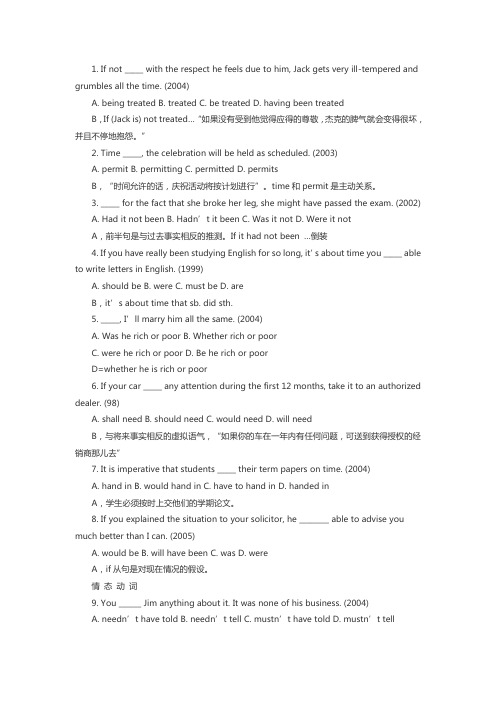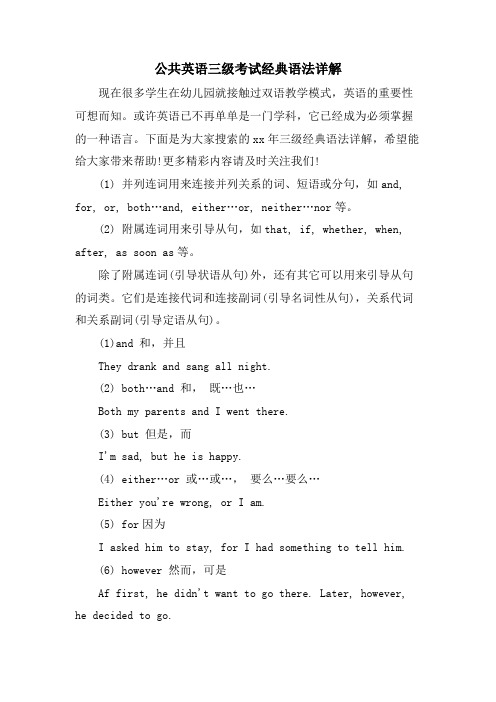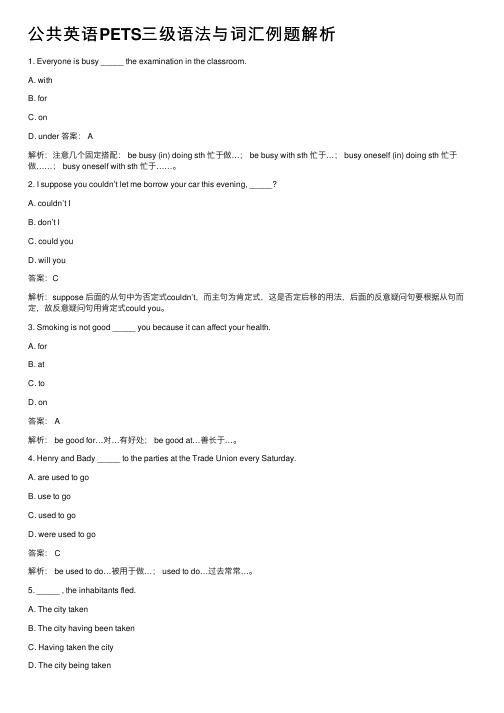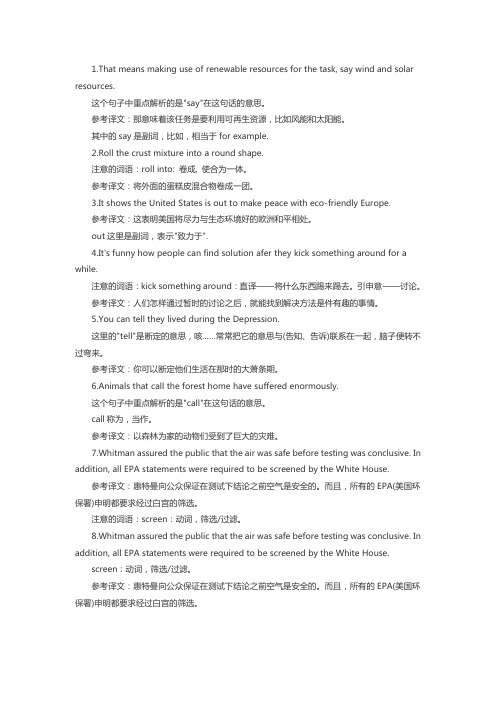最新整理公共英语三级考试经典语法讲解(10)
公共英语三级词汇语法练习(10)

1. If not _____ with the respect he feels due to him, Jack gets very ill-tempered and grumbles all the time. (2004)A. being treatedB. treatedC. be treatedD. having been treatedB,If (Jack is) not treated…“如果没有受到他觉得应得的尊敬,杰克的脾气就会变得很坏,并且不停地抱怨。
”2. Time _____, the celebration will be held as scheduled. (2003)A. permitB. permittingC. permittedD. permitsB,“时间允许的话,庆祝活动将按计划进行”。
time和permit是主动关系。
3. _____ for the fact that she broke her leg, she might have passed the exam. (2002)A. Had it not beenB. Hadn’t it beenC. Was it notD. Were it notA,前半句是与过去事实相反的推测。
If it had not been …倒装4. If you have really been studying English for so long, it’s about time you _____ able to write letters in English. (1999)A. should beB. wereC. must beD. areB,it’s about time that sb. did sth.5. _____, I’ll marry him all the same. (2004)A. Was he rich or poorB. Whether rich or poorC. were he rich or poorD. Be he rich or poorD=whether he is rich or poor6. If your car _____ any attention during the first 12 months, take it to an authorized dealer. (98)A. shall needB. should needC. would needD. will needB,与将来事实相反的虚拟语气,“如果你的车在一年内有任何问题,可送到获得授权的经销商那儿去”7. It is imperative that students _____ their term papers on time. (2004)A. hand inB. would hand inC. have to hand inD. handed inA,学生必须按时上交他们的学期论文。
公共英语三级考试语法详解

公共英语三级考试经典语法详解现在很多学生在幼儿园就接触过双语教学模式,英语的重要性可想而知。
或许英语已不再单单是一门学科,它已经成为必须掌握的一种语言。
下面是为大家搜索的xx年三级经典语法详解,希望能给大家带来帮助!更多精彩内容请及时关注我们!(1) 并列连词用来连接并列关系的词、短语或分句,如and, for, or, both…and, either…or, neither…nor等。
(2) 附属连词用来引导从句,如that, if, whether, when, after, as soon as等。
除了附属连词(引导状语从句)外,还有其它可以用来引导从句的词类。
它们是连接代词和连接副词(引导名词性从句),关系代词和关系副词(引导定语从句)。
(1)and 和,并且They drank and sang all night.(2) both…and 和,既…也…Both my parents and I went there.(3) but 但是,而I'm sad, but he is happy.(4) eithe r…or 或…或…,要么…要么…Either you're wrong, or I am.(5) for因为I asked him to stay, for I had something to tell him.(6) however 然而,可是Af first, he didn't want to go there. Later, however, he decided to go.(7) neither…nor 既不…也不Neither my parents nor my aunt agrees with you.(8) not only…but(also) 不但…而且…He not only sings well, but also dances well.(9) or 或者,否那么Hurry up, or you'll be late.Are you a worker or a doctor?(10) so 因此,所以It's getting late, so I must go.(11) although 虽然Although it was late, they went on working.(12) as soon as 一…就I'll tell him as soon as I see him.(13) because 因为He didn't go to school, because he was ill.(14)unless 除非,如果不I won't go unless it is fine tomorrow.(15)until 直到…He didn't leave until eleven. (瞬间动词用于not… until 构造)He stayed there until eleven.(16)while 当…时候,而 (表示比照)While I stayed there, I met a friend of mine. (while后不可用瞬间动词)My pen is red while his is blue.(17)for 因为He was ill, for he didn't e. (结论是推断出来的)(18)since自从…I have lived here since my uncle left.(19)hardly… when 一… 就I had hardly got to the station when the train left.(20)as far as 就… 来说As far as I know, that country is very small.You may walk as far as the lake. (一直走到湖那里)II. 例题例1 John plays football , if not better than, David.A as wellB as well asC so wellD so well as解析:该题意为:John踢足球如果不比David好的话,那也踢得和David一样好。
公共英语PETS三级语法与词汇例题解析

公共英语PETS三级语法与词汇例题解析1. Everyone is busy _____ the examination in the classroom.A. withB. forC. onD. under 答案: A解析:注意⼏个固定搭配: be busy (in) doing sth 忙于做…; be busy with sth 忙于…; busy oneself (in) doing sth 忙于做……; busy oneself with sth 忙于……。
2. I suppose you couldn’t let me borrow your car this evening, _____?A. couldn’t IB. don’t IC. could youD. will you答案:C解析:suppose 后⾯的从句中为否定式couldn’t,⽽主句为肯定式,这是否定后移的⽤法,后⾯的反意疑问句要根据从句⽽定,故反意疑问句⽤肯定式could you。
3. Smoking is not good _____ you because it can affect your health.A. forB. atC. toD. on答案: A解析: be good for…对…有好处; be good at…善长于…。
4. Henry and Bady _____ to the parties at the Trade Union every Saturday.A. are used to goB. use to goC. used to goD. were used to go答案: C解析: be used to do…被⽤于做…; used to do…过去常常…。
5. _____ , the inhabitants fled.A. The city takenB. The city having been takenC. Having taken the cityD. The city being taken答案: B解析:独⽴主格结构。
英语三级语法考点归纳ppt课件

I have two sisters, who are both students. We were given a lovely double room, which had a sea view.
注: 引导限制性定语从句时,关系代词which可以与that 互换;但引导非限制性定语从句时,只能用which。
在整堂课的教学中,刘教师总是让学 生带着 问题来 学习, 而问题 的设置 具有一 定的梯 度,由 浅入深 ,所提 出的问 题也很 明确
2. 倒装结构
①“only+状语”位于句首(2015.12 T24) 如:Only in this way did I finish the homework.
②当not until…位于句首或者no sooner… than中no sooner… 位于句首时,位于句首时,其后的主句要用倒装语序 (2015.06 T25)(2013.12 T25)(2012.12 T19) 如:Not until the rain stopped did he leave the room.
在整堂课的教学中,刘教师总是让学 生带着 问题来 学习, 而问题 的设置 具有一 定的梯 度,由 浅入深 ,所提 出的问 题也很 明确
公共英语三级语法知识汇总

公共英语三级语法知识大全一、句法分析 (1)二、词法分析 (2)三、时态 (8)四、被动语态 (11)五、情态动词 (12)六、不定式 (14)七、定语从句 (17)八、主语从句 (22)九、表语从句 (23)十、宾语从句 (23)十一、同位语从句 (24)十二、状语从句 (25)十三、虚拟语气 (41)十四、动名词 (27)十五、现在分词 (28)十六、过去分词 (31)十七、独立主格结构 (34)十八、倒装句型 (35)十九、强调句型 (36)二十、主谓一致 (37)二十一、It的用法 (39)一、句法分析1、主语:是句子要说明的人或物,可以作主语的成分有名词,主语一般在句首。
注意名词单数形式常和冠词不分家!. 1) Mr. Lee is a well-known scientist.名词作主语. 2) He reads newspapers everyday.代词作主语. 3) Two and ten is twelve.数词作主语. 4) Smoking is harmful to the health.动名词作主语. 5) To swim in that pool is a great pleasure.动词不定式作主语. 6) What we shall do next is not yet decided.从句作主语2、谓语: 说明主语的动作,状态或特征. 1) The new term begins on the 1st of September.. 2) His father is an engineer.3) She seemed happy.. 4) Li Hua showed me his album.3、宾语:指的是及物动词涉及到的人或物. 1) Wang Ling lent me a novel to read in the bus.. 2) The medicine is good for a cold.. 3) How many pieces do you want?. 4) My little sister always likes to ask questions.. 5) Would you mind coming earlier tomorrow?. 6) He asked me what I was going to do tonight4、宾语补足语:在宾语后面补充说明宾语的动作、状态、特征。
2023年大学英语三级语法知识总结汇总

三级语法考点归纳一.虚拟语气1.i.句中虚拟形式if 引导的非真实条件句(纯粹假设或发生的也许性不大):条件从句主句与现在相反did (be were) would/ should/ might/ could do与将来相反did (be were) would/ should/ might/ could do与过去相反had done would/ should/ might/ could have done例句If we left (leave) now, we should arrive in time.If they hadn’t gone on vacation, their house wouldn’t have been broken (break) into.2.原形虚拟:a.表命令、决定、规定、建议等词语之后的that-分句中,用动词原形。
suggest, demand, advise, propose, order, arrange, insist, command, require, request, desire …… that +(should) do例如He suggested that we should leave early.My suggestion is that we should tell him.b.I.i.(was.形容词/名词tha.….(should.do/例如It is absolutely essential that all the facts be examined first.3.一些句型中的虚拟形式:1.It’.(high.about.th.first.etc..tim.(that.…动词过去时.例.It’.tim.w.left..例.I.i.tim.w.wen.t.bed.2 would rather/sooner 宁愿as if/ though 仿佛would rather/sooner 谓语用过去时与现在或者将来相反as if/ though 谓语用过去完毕时与过去相反4.练习1..______.tr.i.agai.i.I_______you.A.will.a......B.should.a....C.would.wer...D.would.ha.been2.I.i.______.no.fo.th.water.th.plant._______live.A.were.woul.no..B.is.coul.no...C.were.coul...D.did.coul.not3.I.. ______.tha.chanc.t.sho.m.ability.._______th.presiden.o.thi.school.A.hav.no.had.coul.no.become ..B.ha.no.had.woul.no.hav.becom.C.di.no.have.coul.no.become ..D.doesn’.have.wil.no.become4.H.______.b.tha.burgla.i.yo.______.t.sav.him.A.migh.hav.bee.killed.hadn’.com...B.wil.b.killed.didn’.comeC.ma.b.killed.did’.com.......D.coul.b.killed.haven’.come5.I.i._______fo.you.help.._______tha.har.tim.wit.s.littl.money.A.wer.not.woul.no.spen........B.i.not.ca.no.spendC.ha.no.been.woul.no.hav.spen....D.hav.no.been.wil.no.spend6.Wher.______.yo.g.i.wa._______?A.will.break.ou............B.do.wil.brea.outC.would.wer.t.brea.ou........D.will.i.t.brea.out7.Sh.wishe.sh.______.tha.humiliatin.thing.A.doesn’.d....B.didn’.d.....C.haven’.don..D.hadn’.done8.Th.chairma.suggeste.tha.th.meetin.______.pu.off.A.ca.b.....B.b......C.i.......D.wil.be9.I.i.vita.tha.h.______.immediately.A.shoul.g...B.mus.g....C.goe......D.wen.10.I.i.tim.w._______d.ou.homework.A.begi.t....B.ca.begi.t..C.bega.t....D.wil.begi.to答案:1.选C。
英语三级语法知识详解

16~ 语法、词形变化 35
选择、填空
15% 分钟
35% 分钟
25 20% 分钟 25 15% 分钟 100% 120 分钟 40
15
36~ 一般性及应用性文字 选择、填空、匹配 60 61~ 句子、段落 65 应用文 65+ 1 句子选择、 段落翻译 翻译、书写
Ⅴ
合计
Grammar
1. 虚拟语气 2. 定语从句 3. 状语从句 4. 时态 5. 被动语态
表示现在情况 表示过去情况 表示将来情况
虚拟语气
虚拟语气在 在条件从句中
[例句] 1. If you had come a few minutes earlier, you would have met him. 要是你早来几分钟的话,你就能见到他了。(与过 去事实相反) 2. If it were(were to be/should be) sunny tomorrow, I would come to see you. 明天要是天气好的话,我来看你。(与将来事实可 能相反) 3. If I were you, I would go now. 假如我是你的话,我现在就走。(与现在事实相反, 事实上我不可能是你)
1.虚拟语气Fra bibliotek3. If only I ___ to my parents! (But I didn’t.) A. listened B. had listened C. should listen D. would listen 4. Tom suggested that Ann ___ the house. A. sell B. sold C. shall sell D. would sell 5. I wish this bus ___ to the university. A. go B. went C. has gone D. had gone
公共英语三级常用句型(10)

1.That means making use of renewable resources for the task, say wind and solar resources.这个句子中重点解析的是"say"在这句话的意思。
参考译文:那意味着该任务是要利用可再生资源,比如风能和太阳能。
其中的say是副词,比如,相当于for example.2.Roll the crust mixture into a round shape.注意的词语:roll into: 卷成, 使合为一体。
参考译文:将外面的蛋糕皮混合物卷成一团。
3.It shows the United States is out to make peace with eco-friendly Europe.参考译文:这表明美国将尽力与生态环境好的欧洲和平相处。
out这里是副词,表示"致力于".4.It's funny how people can find solution afer they kick something around for a while.注意的词语:kick something around:直译——将什么东西踢来踢去。
引申意——讨论。
参考译文:人们怎样通过暂时的讨论之后,就能找到解决方法是件有趣的事情。
5.You can tell they lived during the Depression.这里的"tell"是断定的意思,咳……常常把它的意思与(告知、告诉)联系在一起,脑子便转不过弯来。
参考译文:你可以断定他们生活在那时的大萧条期。
6.Animals that call the forest home have suffered enormously.这个句子中重点解析的是"call"在这句话的意思。
call称为,当作。
- 1、下载文档前请自行甄别文档内容的完整性,平台不提供额外的编辑、内容补充、找答案等附加服务。
- 2、"仅部分预览"的文档,不可在线预览部分如存在完整性等问题,可反馈申请退款(可完整预览的文档不适用该条件!)。
- 3、如文档侵犯您的权益,请联系客服反馈,我们会尽快为您处理(人工客服工作时间:9:00-18:30)。
公共英语三级考试经典语法讲解(10)
虚拟语气
虚拟语气表示与客观事实相反的假设,由i f虚拟条件从句和主句构成。
一、虚拟语气的基本内容
根据虚拟与其这种与事实相反的假设所对应的时间不同,虚拟语气的i f虚拟条件从句与主句的谓语动词分别有三类构成形式:
假设类型I f虚拟条件从句
主句与现在事实相反 D i d/w e r e W o u l d/s h o u l d d o与过去事实相反 H a d d o n e W o u l d/s h o u l d h a v e d o n e与将来事实可能相反 W e r e t o d o/d i d/s h o u l d d o
W o u l d/s h o u l d d o
例:1、I w o u l d n’t t a l k t h a t w a y i f I w e r e P e t e r.
2、I f t h e w h o l e o p e r a t i o n h a d n o t b e e n p l a n n e d
b e f o r e h a n d,a g r e a t d e a l o f t i m e a n d m o n e y
w o u l d h a v e b e e n l o s t
3、J e a n d o e s n’t w a n t t o w o r k r i g h t a w a y b e c a u s e s h e t h i n k s t h a t i f s h e w e r e t o g e t a j o b s h e p r o b a b l y w o u l d n’t b e a b l e t o s e e h e r f r i e n d s v e r y o f t e n.
4、I w o u l d a s k G e o r g e t o l e n d u s t h e m o n e y i f I k n e w h i m.
5、D o y o u t h i n k t h e r e w o u l d b e l e s s c o n f l i c t (战斗、斗争) i n t h e w o r l d i f a l l p e o p l e s p o k e t h e s a m e l a n g u a g e.
6、I f B o b h a d c o m e w i t h u s, h e w o u l d h a v e h a d a
g o o d t i m e.
二、i f的省略形式(又称虚拟语气的倒装结构)
在i f虚拟条件从句中,如果谓语部分包含w e r e,
s h o u l d,h a d等词,则可以把这些词放到主语前,省略
i f,构成虚拟语气的倒装结构。
三、主句与从句时间不一致时虚拟语气的构成
当虚拟语气的i f虚拟条件从句和主句的动作发生的时间不一致时,要根据各自表示的时间采用对应的虚拟语气的构成形式。
例:1、I f I h a d a t t e n d e d t h e m e e t i n g y e s t e r d a y,
I w o u l d k n o w w h a t h a p p e n e d n o w.
2、I f y o u h a d t a k e n o u r a d v i c e a t t h a t t i m e, y o u w o u l d n o t b e i n t r o u b l e n o w.
四、主观倾向性动词引导的虚拟语气的构成
在英语中存在一些动词,表示建议、命令、要求等主观的倾向,由这些动词引导的t h a t宾语从句中,从句的谓语动词要用s h o u l d+动词原形,s h o u l d可以省略。
这类常见的主观倾向性动词有“一坚持、二命令、三建议、五要求”,分别是:
一坚持:i n s i s t二命令:o r d e r、c o m m a n d三建议:s u g g e s t、a d v i s e(n a d v i c e)、p r o p o s e(提议、建议)五要求:a s k、d e m a n d、r e q u i r e、r e q u e s t、d e s i r e 例:1、T h e d o c t o r a d v i s e d t h a t M r. M a l a n h a v e a n o p e r a t i o n r i g h t a w a y s o a s t o s a v e h i s l i f e.
2、H i s m o t h e r i n s i s t e d t h a t h e p u t o n t h e c o a t w h e n g o i n g o u t.同时,如果在题干中出现上面这些主观倾向性动词的名词和形容词形式,题干中从句部分的谓语动词也要用s h o u l d+动词原形,s h o u l d可以省略。
考试中常见的词汇有:o r d e r,c o m m a n d,s u g g e s t i o n,a d v i c e,p r o p o s a l,d e m a n d,r e q u e s t,d e s i r e,
a d v i s a
b l e,d e s i r a b l e.
五、w i s h t h a t和i f o n l y引导的虚拟语气的构成
W i s h t h a t引导的宾语从句和i f o n l y引起的感叹句都用虚拟语气来表示一种没有实现或无法实现的愿望,
其中w i s h t h a t句型往往翻译为:多么希望?;i f o n l y 表示的愿望较w i s h t h a t更强烈,常翻译为但愿;要是?就好了。
两者的用法基本相同。
两者的用法是:1、当表示与现在的事实相反的一种愿望时,w i s h t h a t引导的宾语从句和i f o n l y引起的感叹句中谓语动词采用的形式是:d i d/w e r e;
2、当表示与过去的事实相反的一种愿望时,w i s h t h a t 引导的宾语从句和i f o n l y引起的感叹句中谓语动词采用的形式是:h a d d o n e;
3、当表示未来一时很难实现的一种愿望时,w i s h t h a t 引导的宾语从句和i f o n l y引起的感叹句中谓语动词采用的形式是:w o u l d d o.
六、w o u l d r a t h e r引导的虚拟语气的构成
W o u l d r a t h e r的意思是“宁愿、宁可”其引导的宾语从句(一般省去t h a t)通常用虚拟语气表示一种与事实相反的假设。
我们可以假设 A.B是两个人,通过牢记一下句式来记住其用法:
1、A w o u l d r a t h e r B d i d s t h:表示与现在或将来事实相反的一种假设
2、A w o u l d r a t h e r B h a d d o n e s t h:表示与过去事
实相反的一种假设。
